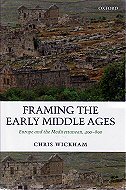|
Framing the Early middle Ages: Europe and the Mediterranean, 400-800
|
|
Chris Wickham
|

|

The Roman Empire tends to be seen as a whole. By contrast, the early middle ages tends to be seen as a collection of regional histories, roughly corresponding to modern nation states. As a result, early medieval history-writing is much more fragmented. There have been few convincing syntheses of socio-economic change in the post-Roman world since 1930s. Although, in recent decades, the rise of early medieval archeology has transformed our knowledge of the period, this has not been adequately integrated into wider syntheses anywhere. This book aims to change this.
In Framing the Early Middle Ages Chris Wickham combines documentary and archaeological evidence together, and creates a comparative history of the period 400-800. He sets out thematic analyses of each of the regions of the latest Roman and immediately post-Roman world, from Denmark to Egypt. The book concentrates on classic socio-economic themes: states and their funding, the wealth and identity of the aristocracy, estate management, peasant society, rural settlement, cities, and exchange. These are discussed region by region, in a way not attempted before. Wickham argues that, without this, the broader development of Europe and the Mediterranean cannot be properly understood.
Earlier syntheses have taken the development of a single region as 'typical', with divergent developments presented as exceptions. Wickham's book aims to construct a synthesis based on a better understanding of differences and the reasons for them. Readers will want to read the book for its richness of detail, but the book is also a more ambitious synthesis of the period than any previous work.
|
|
